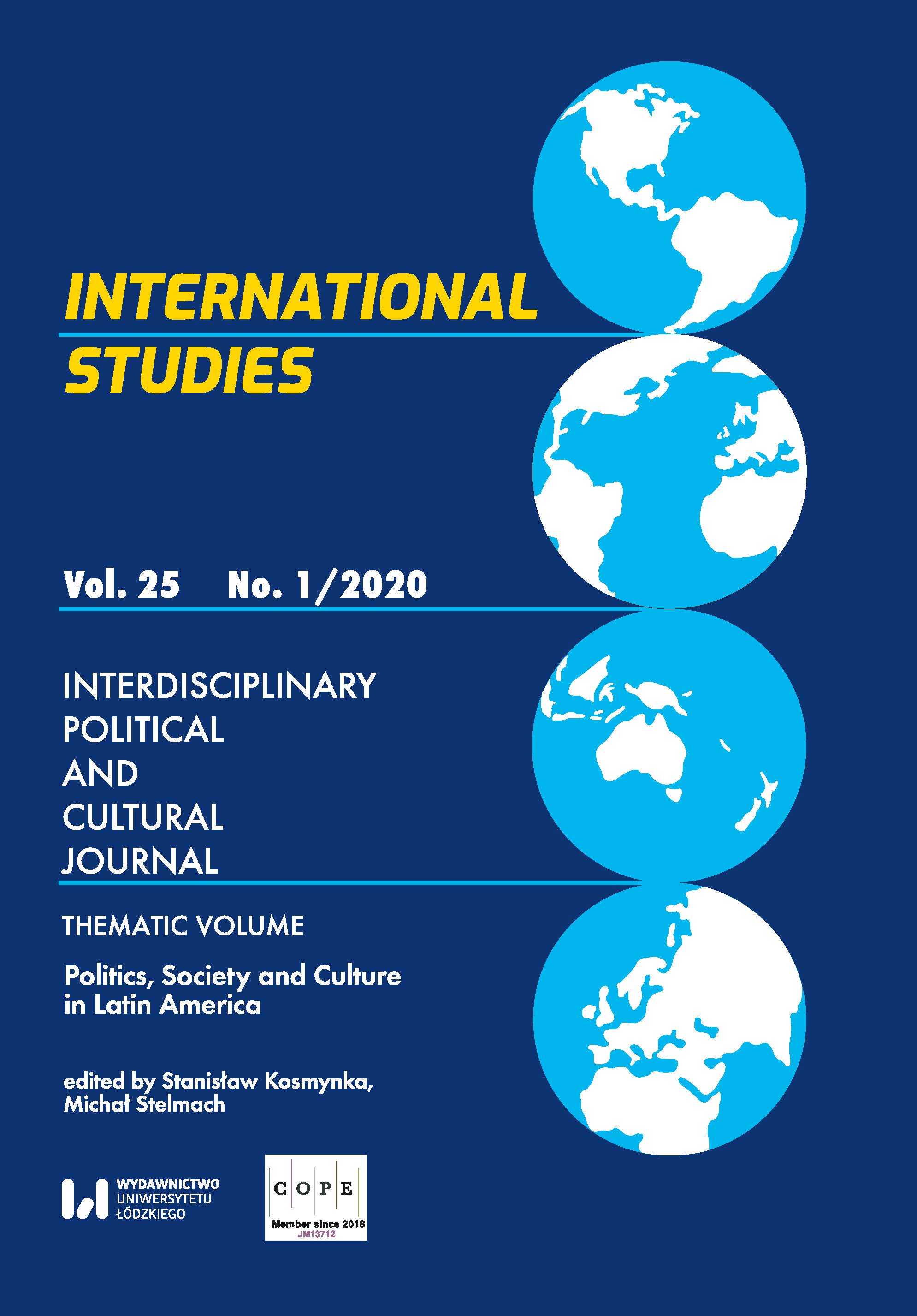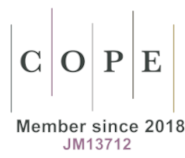Between Autonomy and Independence. The Democratisation of the Armed Forces in Latin America in the Twenty-First Century
DOI:
https://doi.org/10.18778/1641-4233.25.03Keywords:
militarism, politics, civil-military relations, democratisation, Latin AmericaAbstract
The aim of this article is to analyse the new forms of militarism as well as the position and the role of the armed forces in Latin American political systems in the twenty-first century. The first part analyses two selected forms of military participation in politics: the participation of former servicemembers in presidential elections and their performance as presidents, and the militarisation of political parties. The second part of the article focuses on the issue of contemporary civil-military relations in Latin America, discussing the problems associated with the establishment of democratic control over the armed forces, the reform of the Ministries of Defense and the redefinition of the functions of the army.
Downloads
References
Arevalo de Leon, B. “Un problema de Estado. Limites y retos a la subordinación militar en Guatemala.” Nueva Sociedad, 213 (2008): 112–127.
Google Scholar
Booth, J., Wade, C., Walker, T. Understanding Central America. Global Forces, Rebellion and Change. Philadelphia: Westview Press, 2014.
Google Scholar
Cálix, A. “Honduras: de la crisis política al surgimiento de un nuevo actor social.” Nueva Sociedad, 226 (2010): 31–54.
Google Scholar
Dalby, C., Carranza, C., “InSight Crime’s 2018 Homicide Round-Up.” Insight Crime, January 22, 2019, Web. https://www.insightcrime.org/news/analysis/insight-crime-2018-homicide-roundup/
Google Scholar
Donadio, M. “Las relaciones civico-militares y la construción de instituciones en America Latina: enfrentando la crisis de las jóvenes democracias.” Ponencia preparada para el XXIV Congreso Internacional, Latin American Studies Association, Dallas, Texas, 27 al 29 de Marzo de 2003, 27 March 2003, RESDAL, Web. 12 December 2018, http://www.resdal.org/Archivo/d00001a3.htm
Google Scholar
Elías, J. “Guatemala elige presidente este domingo en medio de gran crisis.” El País, 22 October 2015, Web. 12 January 2019. https://elpais.com/internacional/2015/10/22/america/1445525679_278701.html
Google Scholar
Kohn, R., The Forgotten Fundamentals of Civilian Control of the Military in Democratic Government. Working Papers of the Project on U.S. Post-Cold War Civil-Military Relations. Harvard University: John M. Olin Institute for Strategic Studies, 1997.
Google Scholar
Kruijt, D., “Las fuerzas armadas en América Latina, antes y hoy.” Ciencia politica, 14 (2012): 95–112.
Google Scholar
Kruijt, D., Koonings, K. “Fuerzas Armadas y política en América Latina: perspectivas Futuras.” Iberoamericana, II, 8, (2002): 7–22, Web. 10 December 2018. http://www.iai.spk-berlin.de/fileadmin/dokumentenbibliothek/Iberoamericana//08-kruijt-koonings.pdf
Google Scholar
Krzywicka, K., “‘Powrót przywódcy.’ Dylematy transformacji politycznej w Wenezueli”. Doświadczenia demokracji w Ameryce Łacińskiej. Eds. M. Kania, K. Derwich, Kraków: Wydawnictwo UJ, 2008.
Google Scholar
Larsen, E. Civil=Military Relations: Continuity or Change? A comparative Analysis of El Salvador, Guatemala and Honduras. Thesis Submitted for the Degree. Bergen: University of Bergen, 2004. Web. 20 November 2018. http://citeseerx.ist.psu.edu/viewdoc/download?doi=10.1.1.114.2423&rep=rep1&type=pdf
Google Scholar
Latinobarometro, Informe 2017. Buenos Aires, 2017, Web. 10 December 2018, https://www.latinobarometro.org/latContents.jsp
Google Scholar
Manaut, R., Sotomayor, A. “El dilema mesoamericano: la inseguridad externa y la vulnerabilidad intrna.” America Latina: integración o fragmentación? Ed. R. Lagos. Buenos Aires: Edhasa, 2008.
Google Scholar
Martinez, J. “El cómico Jimmy Morales, elegido presidente de Guatemala.” El País, 26 October 2015, Web. 25 January 2019, https://elpais.com/internacional/2015/10/26/actualidad/1445824124_082191.html
Google Scholar
Montecinos, F. “Politicos de verde olivo Apuntes sobre el militarismo latinoamericano y su influencia política en las últimas décadas.” Revista Austral de Ciencias Sociales, 18 (2010): 107–119.
Google Scholar
DOI: https://doi.org/10.4206/rev.austral.cienc.soc.2010.n18-06
Norden, D. Democratizing Revolutionary Soldiers: Politicised Militaries and Democratic Transitions in Latin America. Flacso: Buenos Aires, 2014, Web. 30 January 2019, http://web.isanet.org/Web/Conferences/FLACSO-ISA%20BuenosAires%202014/Archive/a055fe8a-6ea4–47e5-b373–3347c4cd72dc.pdf
Google Scholar
Pietraszczyk-Sękowska, J. “Ollanta Humala na scenie politycznej Peru – transformacja programu politycznego, społeczeństwa czy państwa?” Transformacje demokratyczne w Ameryce Łacińskiej: problemy-wyzwania-implikacje. Ed. K. Krzywica, Lublin: Wydawnictwo UMSC, 2014.
Google Scholar
Pion-Berlin, D., A New Civil-Military Pragmatism in Latin America, RESDAL, 2003, Web. 23 January 2019, http://www.fes-seguridadregional.org/images/stories/docs/0888–001_g.pdf
Google Scholar
Pion-Berlin, D., “Militares y democracia en nuevo siglo”. Nueva Sociedad, 213 (2008a): 50–63, Web. 20 February 2019, http://www.academia.edu/2867830/Militares_y_democracia_en_el_nuevo_siglo
Google Scholar
Pion-Berlin, D., “Unexpected Civil-Military Relations in the twenty first Century Latin America.” Nueva Sociedad, 213, (2008b), Web. 10 October 2018, http://nuso.org/media/articles/downloads/3493_2.pdf
Google Scholar
Pion-Berlin, D., Martinez, R. Soldiers, Politicians, and Civilians. Reforming Civil-Military Relations in Democratic Latin America. Cambridge: Cambridge University Press, 2017.
Google Scholar
DOI: https://doi.org/10.1017/9781316576632
Sotomayor, A. Diagnostico de las relaciones civico-militares en America Latina: Avances y retrocesos en materia de politica de defensa. CIDE, 2006.
Google Scholar
Stelmach, M. “Wojsko a demokracja w Gwatemali. Pozycja i rola sił zbrojnych w Gwatemali w okresie rządów gen. Otto Pereza Moliny.” Systemy polityczne i komunikowanie polityczne w Europie i na świecie. Eds. K. Kamińska-Korolczuk, M. Mielewczyk, R. Ożarowski. Gdańsk: Wydawnictwo Uniwersytetu Gdańskiego, 2016
Google Scholar
UNODC, Global Study on homicide, Vienna 2019, https://www.insightcrime.org/news/analysis/insight-crime-2018-homicide-roundup/
Google Scholar
Velazquez, A., “Fuerzas Armadas y gobiernos de izquierda en América Latina.” Nueva Sociedad, 2013 (2008): 80–94, Web. 1 December 2018, http://nuso.org/articulo/fuerzas-armadas-y-gobiernos-de-izquierda-en-america-latina/
Google Scholar
Villatoro, D. “Los militares que financian Jimmy Morales”. Plaza Publica, 13 October 2015, Web. 20 November 2018, https://www.plazapublica.com.gt/content/los-militares-que-financian-jimmy-morales
Google Scholar
Downloads
Published
How to Cite
Issue
Section
License

This work is licensed under a Creative Commons Attribution-NonCommercial-NoDerivatives 4.0 International License.

















